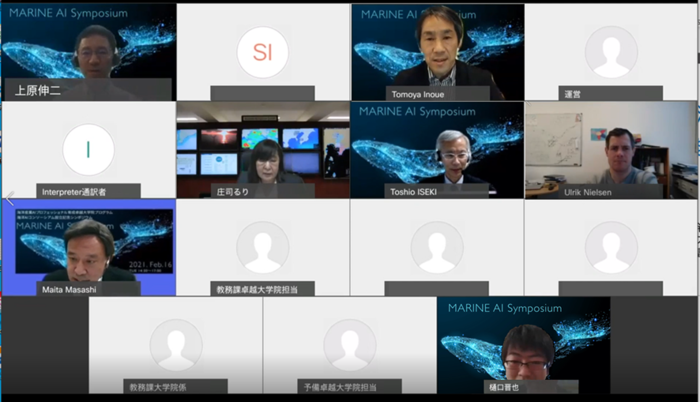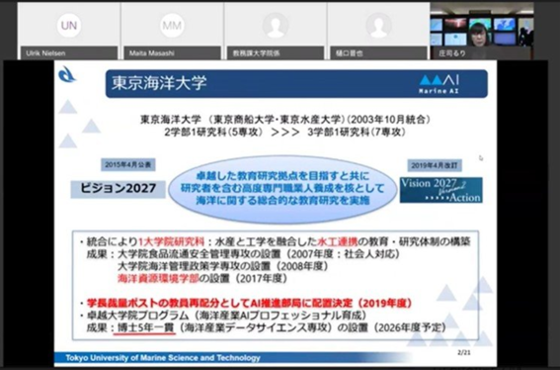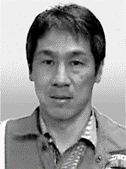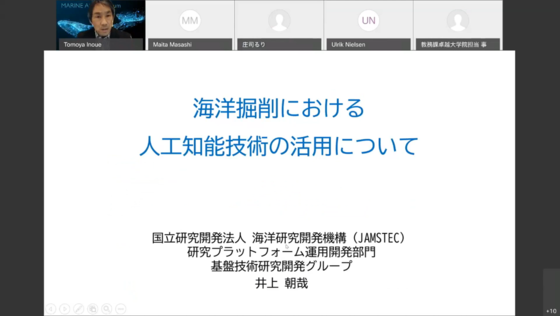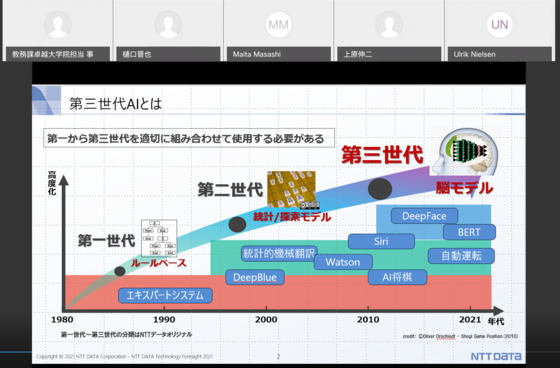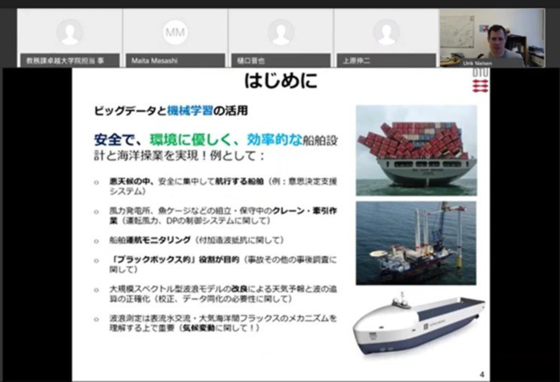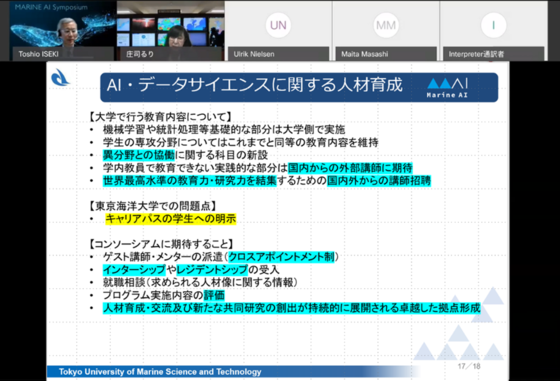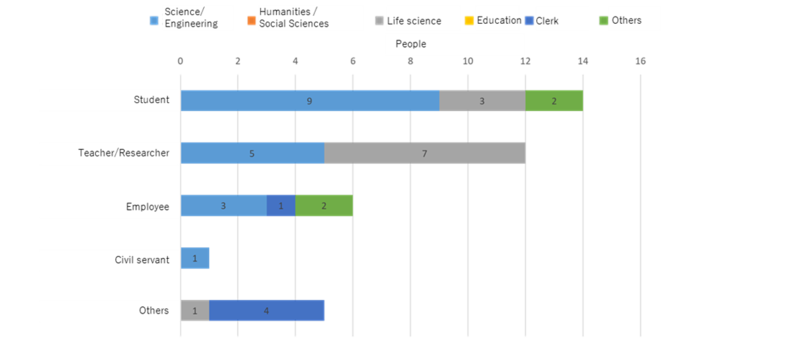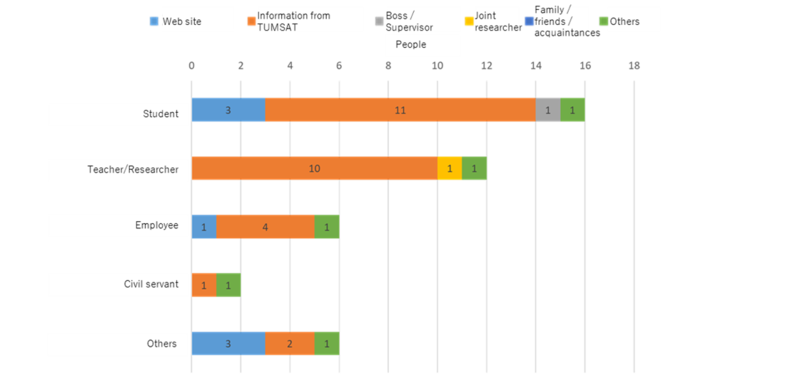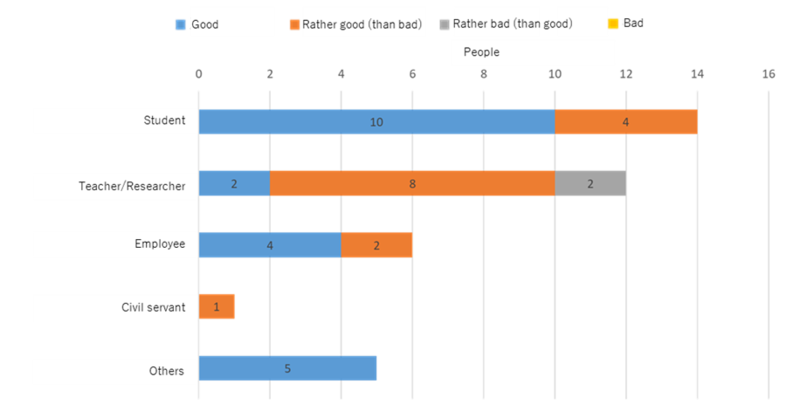ACTIVITYActivity reports
- HOME
- Activity reports
- Symposium to commemorate the establishment of the Marine AI Consortium was held
Symposium to commemorate the establishment of the Marine AI Consortium was held
TUMSAT held "Symposium to commemorate the establishment of the Marine AI Consortium" on 16th February 2021.
It was conducted online to prevent the spread of COVID-19, and about 140 people participated. The symposium began with a keynote speech by Vice President Shoji, lectures by experts such as marine AI consortium partner institutes. At last part. Finally, a panel discussion was held on the theme of "human resources development related to AI and data science."
Keynote Speech
"The world the Development of WISE Program to foster AI professionals for Marine Industries is aiming for"
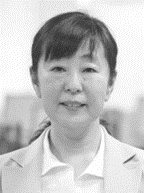 |
SHOJI Ruri (Vice President, TUMSAT / Program coordinator) She gave an overview of " Development of WISE Program to foster AI professionals for Marine Industries" and Human Resources Development and introduced our efforts so far. Lecture material (Japanese only) |
Lecture 1
"Utilization of artificial intelligence technology in offshore drilling"
Lecture2
"Status and future of the smart fisheries"
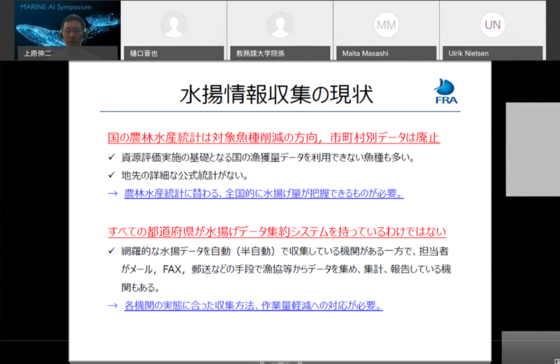
Lecture 3
"Forefront of AI technology-Development of Natural Language Processing and Scaling Law-"
Lecture 4
"Using Big Data in the pursue of a sustainable and safe maritime future"
Panel Discussion
"Human resource development related to AI and data science"
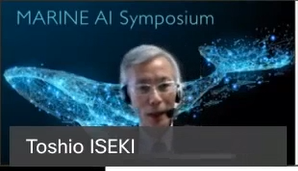 |
Facilitator: ISEKI Toshio (Dean of Marine Technology, TUMSAT / Head of program) Panelists: Symposium speakers |
Each panelist introduced the importance, necessity, issues and problems of human resource development in each institution.
- HIGUCHI Shinya, NTT Data
It is said that the number of advanced IT human resources required in 2030 will be 730,000 (about 1.5% of the total working population), of which about 380,000 will be in short supply. Human resources development will not be easy because the knowledge required to introduce AI is diverse, including laws, contracts, and ethics, in addition to AI itself.
In addition, as the ability to prepare as an AI human resource, it is not passive, but the ability to set issues by discovering issues by themselves and making trial and error, and the skill to collaborate with other fields because services are established by integrating devices, communications, AI, and the cloud. Also required.
- INOUE Tomoya, Japan Agency for Marine-Earth Science and Technology (JAMSTEC),
JAMSTEC possesses a wealth of data but feels that it has not been able to fully utilize the data it possesses not only for current research but also for further development. The key to this is human resources. He stated that what is expected of such human resources is a person who has a wide range of abilities related to AI and the ability to set problems and solve them by himself.
- UEHARA Shinji, Japan Fisheries Research and Education Agency
He explained that the current situation is that researchers in fisheries science and ecology are challenging AI. Examination when hiring R & D staff The recruitment examination has a descriptive examination on basic knowledge of fisheries, which makes it difficult to secure human resources other than fisheries and oceanography. He said he hopes that AI human resources will be trained at fisheries and marine universities.
(Facilitator ISEKI)
I imagine that the situation is similar at this stage in this field, but I understand that specialized researchers or engineers need to move closer to data science. We would like to ask DTU to answer questions that we would like to ask as the same educational institution.
- Dr. Ulrik Dam Nielsen (DTU)
Q What do you think are the fundamental skills required of AI professionals (data scientists) in various industries?
A I think that the key to studying with students and working with people in the industrial world is the expertise in each area. It will be important for students to acquire a solid background knowledge of their specialized fields. It is important to build up knowledge of AI or data science based on the knowledge of the specialized field. In other words, a good ship engineer can be a good AI professional. In other words, it will be possible to apply the learned data science skills to various fields. On the contrary, if those who have learned data science can apply their knowledge in their specialized fields, I think it will be much more difficult.
This is because it is very difficult to learn knowledge from scratch without having expertise in that area.
Q What is the most important thing for teaching those skills?
A I think you can answer simply. Whether you analyze data or make full use of machine learning, no matter what area it is, if what comes in is like rubbish, what comes out is like rubbish. ( rubbish in - rubbish out)。So, whether it's engineering or an expert, whether you're about to start a job, you must first have a solid knowledge of the specialized field behind it. The next step is that you can't learn AI or machine learning. Even if the result comes out, it cannot be evaluated without knowledge of the specialized field, and the result analyzed using AI cannot be evaluated.
Q Are there any difficulties in teaching data science to your students? How will you overcome those difficulties?
A Fortunately in Denmark we have a very good working relationship with industry so it's not difficult to teach. In fact, I have introduced and taken up data science in projects and classes, but I think that I have been able to teach students firmly. Again, knowledge of each area of expertise is of paramount importance, so the first thing you need to do is acquire knowledge of your area of expertise and then apply data science.
(Facilitator ISEKI)
We could remind ourselves the importance about the expertise about the domain they belong to. - SHOJI Ruri, TUMSAT
At TUMSAT, we will provide basic data science education related to AI while maintaining education in specialized fields. Practical parts that cannot be educated by university faculty members will be realized through collaboration with the outside, centered on consortium cooperation organizations. She also said that it is necessary to clarify what kind of career can be opened by acquiring such skills of AI professionals for students.
The panel discussion ended as the end time was approaching and it was regrettable that the dialogue was likely to be more exciting.
Audience Questionnaire (N=38)
- Specialty
- How did you know that this symposium was held?
- Overall evaluation of the symposium


